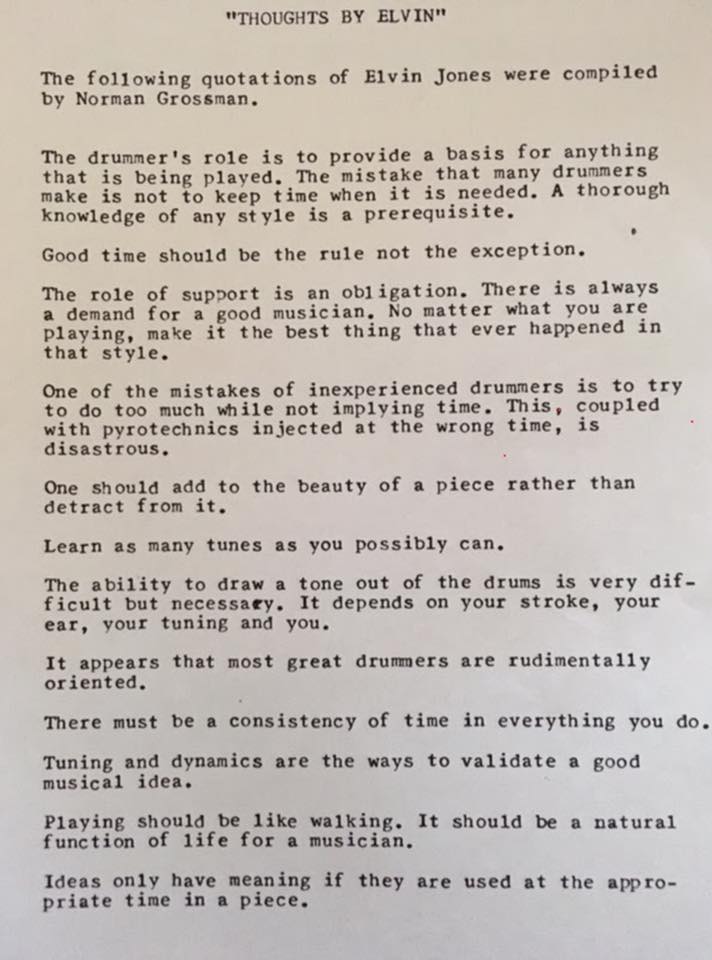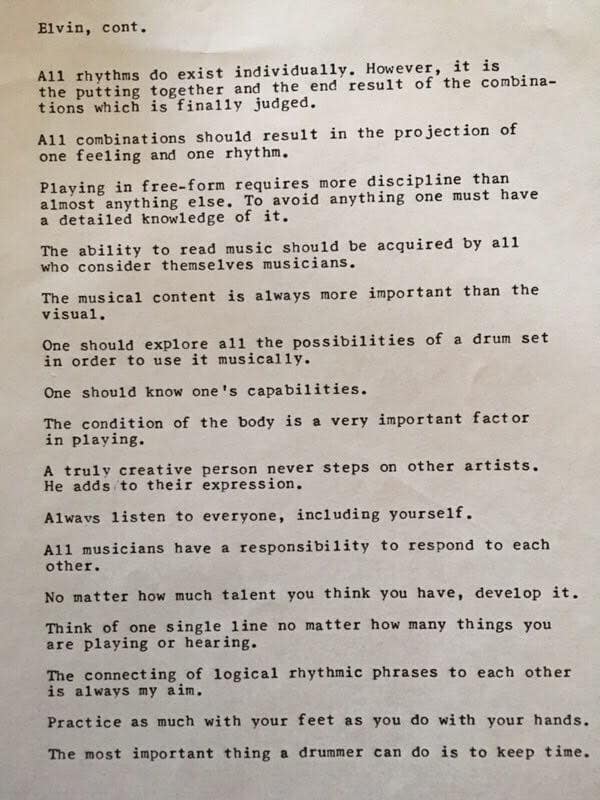"Thoughts by Elvin" is a two-page document featuring advice from Elvin Jones. It was typed by legendary drummer (and legendary educator) Ed Soph (you can watch one of Soph's many spectular clincs). Soph reported to have recieved the "thoughts" from Norman Grossman (see Soph's Facebook comment below). Jones and Grossman both taught at Frank Ippolito's Professional Drum Center in NYC.

Elvin Jones (1927 - 2004) is most well-known for his tenure with John Coltane. Here's Elvin performing "Impressions" with Trane -- check out their duo playing at about 9:30.
You can read about Ippolito's Professional Drum center in this note by Mike Dolbear, and posted to facebook by Allen Herman in May 2016. There are also numerous videos of the shop that captured many of the clinics that were hosted there. Below is part 1 of a three-part series featuing Gene Kruppa and Pappa Joe Jones
Thoughts By Elvin
Elvin Jones' Advice
- The drummer’s role is to provide a basis for anything that is being played. The mistake that many drummers make is not to keep time when it is needed. A thorough knowledge of any style is a prerequisite.
- Good time should be the rule not the exception.
- The role of support is an obligation. There is always a demand for a good musician. No matter what you are playing, make it the best thing that ever happened in that style.
- One of the mistakes of inexperienced drummers is to try to do too much while not implying time. This, coupled with pyrotechnics injected at the wrong time, is disastrous.
- One should add to the beauty of a piece rather than detract from it.
- Learn as many tunes as you possibly can.
- The ability to draw a tone out of the drum is very difficult but necessary. It depends on your stroke, your ear, your tuning and you.
- It appears that most great drummers are rudimentary oriented.
- There must be a consistency of time in everything you do.
- Tuning and dynamics are the ways to validate a good musical idea.
- Playing should be like walking. It should be a natural function of life for a musician.
- Ideas only have meaning if they are used at the appropriate time in a piece.
- All rhythms do exist individually. However, it is the putting together and the end result of the combinations which is finally judged.
- All combinations should result in the projection of one feeling and one rhythm.
- Playing in free-form requires more discipline than almost anything else. To avoid anything one must have a detailed knowledge of it.
- The ability to read music should be acquired by all who consider themselves musicians.
- The musical content is always more important than the visual.
- One should explore all the possibilities of a drum set in order to use it musically.
- One should know one’s capabilities.
- The condition of the body is a very important factor in playing.
- A truly creative person never steps on other artists. He adds to their expression.
- Always listen to everyone, including yourself.
- All musicians have a responsibility to respond to each other.
- No matter how much talent you think you have, develop it.
- Think of one single line no matter how many things you are playing or hearing.
- The connecting of logical rhythmic phrases to each other is always my aim.
- Practice as much with your feet as you do with your hands.
- The most important thing a drummer can do is to keep time.







